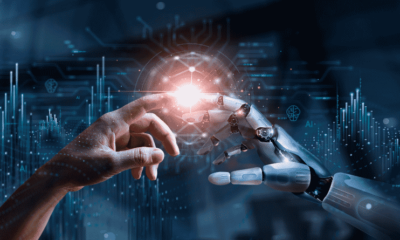
Artificial Intelligence is growing rapidly, and business owners are adopting it. We’re listing the pros and cons of AI’s professional usage, looking into the business world’s future.
Whether we like it or not, AI is here to stay. Today, artificial intelligence is redefining the way we conduct business. In the past couple of years, tech and business industry pros, alike, have weighed in on the benefits of AI. This isn’t to say there aren’t any risks of AI, however. Robotics, information technology and artificial intelligence technology all have a lot to offer. By progressing with these technologies, however, we may be overlooking possible pitfalls.
Below are the three biggest benefits, and three biggest risks, of AI in business.
Benefit One: Virtual Assistance
Imagine the capacity of a major business powered by AI virtual assistance? Already, businesses are starting to adopt futuristic technology which will pave the road for such a future. We may see a future where AI systems interact with hundreds—or even thousands—of people every day. Across the real time market, as well as social media, virtual assistance is incredibly valuable.
If intelligent systems and chatbots become cornerstone business tools, customers and employees alike can be constantly updated with notifications. They can also refer to constantly generated business information derived from customer queries.
Benefit Two: Automation
Automation is already an innovative business component. This isn’t to say it can’t be enhanced by AI, however. There’s currently a growing trend towards routine work automation. Artificial intelligence, quickly automating business processes, is spawning a new era—similar to the industrial era, even.
Not only is AI an incredibly capable automation tool, it makes business management, entrepreneur endeavors and decision making far easier. If AI-powered automation takes off, we may even witness the dawn of AI-created business solutions.
Benefit Three: Behavioral Science
While AI systems like won’t surpass humans in behavioral management, science and influence, several innovations have empowered machine-learning in such a direction. Upcoming AI systems may be capable of recording, analyzing and understanding human behavior. Then, by judging which human responses are “reasonable” or “normal,” they can detect abnormal customer—and even employee—behaviors. Imagine a business powered by an AI security network—wherein computers target bugs, cyberattack risks and employee failures before they’re damaging to an infrastructure.
Risk One: Programming Errors
The first set of AI risks exists in programming errors. AI software containing errors can result in business mainframe crashes. Even worse: Coding errors can result in major software projects, like HealthCare.Gov, to fail. Nuisances and delays aside, AI software errors may result in costly outcomes. If a business is responsible for the health or wellbeing of others—negative outcomes will be even worse.
Risk Two: Cyberattacks
If a business is assisted by AI, cyberattacks will always be a risk. Criminals and delinquents are constantly attacking computers with viruses, malware and dangerous algorithms. These software-based creations aren’t too different from AI itself. If a malicious user wants to damage an AI system, they need only reduce its ability to make high-stakes decisions. This risk is particularly dangerous when presented to any AI system responsible for controlling robots, driving cars or defending a business against other attacks.
Risk Three: A Failure in Reason
While AI has come a long way—promising to evolve further—its faults will likely remain far into the future. Sometimes, an AI system simply can’t mimic human behavior. Thus, the AI system will judge prospects, outcomes and tasks based upon what it deems to be “reasonable” or “normal.” While this may seem like a solid foundation, it’s an arguably limited one. As AI evolves, businesses may adopt these technologies due to their startling processing power. In doing so, however, they’ll continue overlooking the less-than-human factor. Is this necessarily a problem? Well, no. Not really. It could become a problem, however, if businesses continue pursuing this quality—misinterpreting highly advanced systems for “human.”
AI is already being applied to detect abnormal user behaviors, limit cyberattacks, eliminate bugs and improve business internals. While the future is uncertain, AI will definitely play a part in business processes. Likely, tech experts will work to eliminate the inherent risks of artificial intelligence. In doing so, they’ll make the benefits far more valuable. We fortunately live in a world governed by constant quality screening. While the advancement of AI is startling—even frightening—it’s still protected by a “safety network” of sorts. In high hopes, this quality control will protect our businesses, and their customers, while offering some of the world’s best technological innovations.



